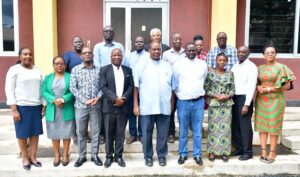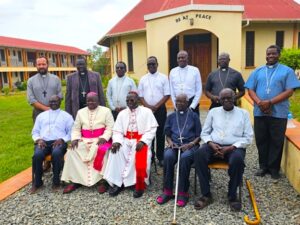CUEA: The growth of Chaplaincy Service at the Catholic University makes the Outgoing Chaplain happy
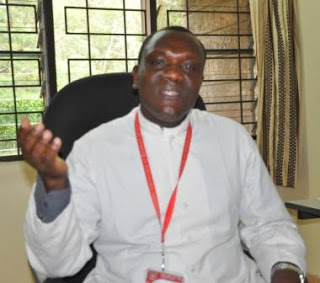
Rev. Fr. Charles Kyallo, Outgoing CUEA Chaplain in his Office
As his second term in office as chaplain of Catholic University of Eastern Africa (CUEA) comes to an end on 8th, May, 2018, Rev. Fr. Charles Kyallo says it has been an opportunity to learn as well as grow with the institution. For the last six years he has been at the helm, overseeing the spiritual and moral formation as well as accompaniment for both students and staff at AMECEA’s High Institute of Learning, he is grateful that he is leaving CUEA with a better perspective of what it means to serve.
“It is time for me to pass the mantle over to the next person so that this great institution can continue to grow,” he says in an interview with AMECEA online News at his office in CUEA’s main campus in Nairobi Kenya.
“In 2012, the first thing I was to do in the office was to come up with a strategic plan for the chaplaincy for 2012-2022 and was aimed at strengthening the pastoral work. It helped define the four major objectives under which the chaplaincy currently operates and this has seen the growth in the ministry,” he explained.
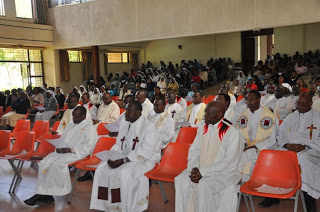
The objectives include: worship and liturgy where the university strives to maintain for each liturgy an environment of love, awe, mystery, reverence, thanksgiving and praise to the Lord; outreach and evangelism chaplaincy strives to foster an atmosphere which emphasizes to all members of CUEA family their Christian responsibility of service to others; the third objective is leadership and involvement and here they strive to foster a culture of commitment and broad-based participation in ministries and organizations, inspiring CUEA family to share their specific talents with the community; lastly the fourth objective of the chaplaincy is to create and strengthen spiritual movements by increasing awareness of existing spiritual movements and faith groups.
“The academic and intellectual excellence which is mostly stressed in some of the higher learning institutions, often bring more problems in future to the students if their spiritual and moral aspects of life are not taken care of. The chaplains must therefore know that their roles cannot be played by the Vice Chancellors, neither by the Deputy Vice Chancellors and definitely neither by the government. Their role of filling that spiritual gap which is in the heart of every human person and to accompaniment to these young people must therefore be prioritized,” he cautioned.
In regards to issue of integrating non-Catholic students to fit in the Catholic identity of CUEA, Fr. Kyallo says that the minute one talk about a Catholic University, they cannot keep the Church out explaining that, the church is connected with spiritual and moral formation and the chaplain is therefore sent by the Church to bring about the Catholic identity of the institution through spiritual and moral formation as well as accompaniment.
He said that he found two documents very essential for his work and he recommends them to the next chaplain; they include The Apostolic Constitution Sapientia Christiana of the Supreme Pontiff Pope John Paul II on Ecclesiastical Universities and Faculties and The Ex Corde Ecclesiae where number 27 of this particular document is very clear about the Catholic Identity of the institution; it states towards the end that Non-Catholic members are required to respect the Catholic character of the University, while the University in turn respects their religious liberty. This Fr. Kyallo says is what has often guided any kind of resolutions he took in regards to the non-Catholics students and staff members.
Among the growth he has helped realize during his tenure includes the growth of spiritual movements from five when he joined the institution to now eleven, also the formation of the seven ministries which were a recommendation of the review of the strategic plan and were launched in February, 2017. The ministries touch on every aspect of the university community in terms of moral and spiritual formation and make more staff members and students be involved. They are Spiritual Welfare Ministry, Spiritual Formation, Social Concern, Worship and Liturgy, Ecumenism Inter-Religious Dialogue, Communication Ministry and finally Mentorship Ministry.
As he prepares to leave the office he thanked the religious and clergy who are part of CUEA Family for helping in promoting the Catholic Identity of CUEA. “Thanks to your services the institution has five Eucharistic celebrations daily except on Thursdays when the we hold one community Mass service,” he said.
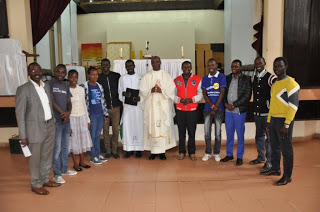
April Mass led by the Main celebrant of the day
Rev. Fr. Dominic Savio Kaburu
He however pointed out that the biggest challenge the chaplaincy is currently facing is lack of a specious chapel to conduct the Eucharistic celebrations. “The Chapel is too small it cannot accomodate all participants during the Thursday’s Community Mass, we therefore have to move from time to time depending on the availability of the halls,” he explained adding that most of the time they use the Missio hall, however, during the exam period, they have to find an alternative venue.
According to Fr. Kyallo the office of the Chaplain in CUEA was created in 1993 as a Campus Ministry following the award of the Charter in 1992. Prior to its creation the spiritual life of CUEA community was coordinated from the Dean of Students. The University’s growth and spiritual demand gave rise to the Campus Ministry under a warden starting March 1994. Later this was to grow to a Chaplaincy in the beginning of the Academic Year 1994-1995 when the Late Servant of God Cardinal Maurice Otunga granted the chaplaincy full Canonical Rights and duties to operate and meet some of the rising pastoral demands
∽End∽
By Pamela Adinda, AMECEA Online News

